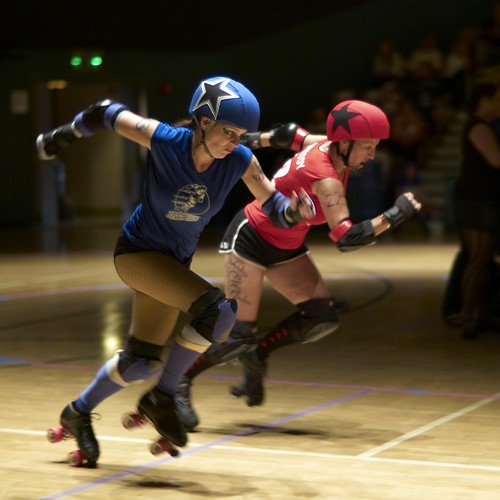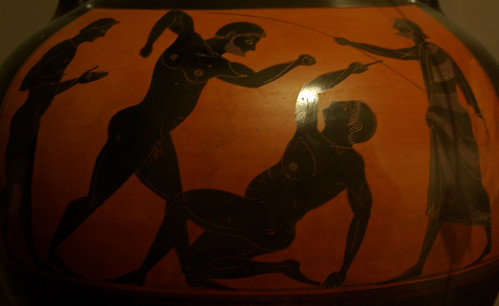Depending on how well you know me, that may or may not sound surprising, but for those of you who have known me since childhood, it should definitely come as a shock.
See, in gym class, I was hiding. Literally. Our gym had this weird little stairwell that jutted out just enough to block the coach's view. Since we played kickball about 78% of the time in elementary school, we were often lined up next to this hideaway. I would press myself up against the painted cinderblocks, strategically looping back behind each person who was after me in line. With a little luck, I could go several gym classes without ever having to kick the ball.
In the outfield, I did what most of my outcast compatriots did:
This strategy carried me most of the way through school, but the stakes were raised when I had to take one year of physical education in high school. There were seldom kickball games (basketball was the game of choice, and for some reason all of the girls who actually played on the basketball team were on one side against the rest of us. A real exciting game, I'm sure.)
The punishment for not dressing out was having to walk the track, so I calculated how many times I could do that without jeopardizing my grade. Then I hid. When it was time for the one-day fitness exam, I stayed home sick.
Gym was miserable. I hated it. It was not that I did not like it or that it simply didn't showcase my strengths, it was that it was the worst thing I had to do in school, and that included being the subject of gossip or having my crush find out I liked him.
Sure, some might say, we're just nerds who didn't get to dominate this field. We had plenty of other opportunities to showcase our skills. Maybe we were whizzes in math or writing. Maybe we could paint really well or play the saxophone. Why should gym class be made warm and fuzzy just to appease a few kids who can't cut it in a competitive sphere, making it harder for people with athletic skills to hone them in the classroom?
But what about when the negative impacts of physical education turn people away from fitness (especially women, who tend to get more negative messages about athleticism--being sweaty is "unfeminine" after all)?
Who Else Hated Gym?
This came to my mind recently when I read this post from The Rabbit Hole. In it, a trainer discusses how many people she sees who are intimidated by (or downright terrified of) the gym. She has a call to action for people who are in charge of physical education (coaches, school teachers, fitness counselors, etc.) She challenges them to find ways to make exercise a welcoming space for all:
I contend that the physical education environment is not meant to create superstars, it is intended to foster learning and a love for activity. Those who love sports and competition will seek out additional opportunities to be active. It is those who will only experience activity in gym class who we need to worry about.This trainer's experience has been mirrored in my own anecdata. While thinking about writing this post, I posed some questions on Facebook. Amanda, a friend of mine who is now a Pilates instructor and someone who touts the benefits of physical activity and the mind-body connection on a daily basis, explained that she hated gym in school and spent much of her time using the same tricks I did to avoid having to do it. Another commenter (Mike) said that as an at-risk counselor, he saw a lot of students who cited a fear of gym class as one of their motivators for dropping out of school. In particular, the humiliation of changing in the locker room scarred many of them.
Sure, some might say, we're just nerds who didn't get to dominate this field. We had plenty of other opportunities to showcase our skills. Maybe we were whizzes in math or writing. Maybe we could paint really well or play the saxophone. Why should gym class be made warm and fuzzy just to appease a few kids who can't cut it in a competitive sphere, making it harder for people with athletic skills to hone them in the classroom?
But what about when the negative impacts of physical education turn people away from fitness (especially women, who tend to get more negative messages about athleticism--being sweaty is "unfeminine" after all)?
Must Fitness Be a Competition?
I can remember only a single activity from gym class that was not a competition. For a few minutes on two different occasions, we warmed up for the day by doing the first part of a tai-chi tape. This was the only time in my entire exposure to athletics that I wasn't being directly matched up against and compared to someone else. It was also--I'm sure not coincidentally--the only time I enjoyed gym (unless you count my "punishment" of walking around the track talking with one of my likewise outcast friends).
It seems that athleticism and competition are so innately tied up that we have a hard time decoupling them.
In her book Bodily Arts, Debra Hawhee explains that the training for athletics in ancient Greece closely mirrored the training for sophistry, the rhetorical training for public debates. In both of these pedagogies, conflict and tension are not only prominent, but they are a necessary part of the circumstances.
But Hawhee explains that this tension, this strife, does not have to be destructive. We do not have to destroy one another to "win," and the Greeks understood this, often finding honor in the act of the athletic display itself, not necessarily the victory over an opponent. This agonistic tension is nearly invisible in our contemporary displays of rhetoric. Instead of an ongoing, sustained debate between opposing sides where both learn from one another and find honor in entering into the struggle, we get crossfire-style high drama that Hawhee says is best exemplified by "the pummeling style of cable television's debate shows." No one is listening to anyone else, and there certainly isn't any learning taking place between the opponents. This is not agonism; it is antagonism.
Perhaps we have subverted the nobler and more productive agonistic trends in athletics just as we have in rhetoric. When everything must be about the win, we lose focus of the other benefits of athleticism.
Are Millennials Less Antagonistic?
A recent Wall Street Journal article laments the death of elite athleticism because the Millennial generation is turning competitive races into "parades." Citing events like the tremendously popular Color Run and Warrior Dash (neither of which post winners or even finish times), the author cites those who see this as a sure sign of our impending doom. Without competition, they wonder, how will we ever get stronger? What will motivate us if its not avoiding defeat at the hands of our peers?I was a Color Run participant, and I have to admit that the race was by far the friendliest I've done. Yes, some people were walking. There was less pressure to push ourselves.
I haven't yet competed in a Warrior Dash (though I'm doing a timed obstacle course in two weeks), but I have friends who have. The training they've gone through and the work they did on the course did not seem unmotivated to me.
I don't know if my generation is more agonistic, but there are some signs that we may be less antagonistic. We seem more willing to collaborate than workers in previous generations (in the aggregate, of course there are exceptions).
If activities like the Color Run and the Warrior Dash are getting more people to feel confident and excited about fitness, isn't that a good thing? Shouldn't that be a win for Millennials, not a loss?
The Pedagogical Implications of My Roller Derby Aspirations
I used to think that I just wasn't an athletic person. Using the lingo of Multiple Intelligences, I had always excelled in the logic and verbal intelligences. So what if I wasn't kinesthetic? So what if I didn't like playing team sports? I could go to college on an academic scholarship and someone else could go on a basketball scholarship and the world would be fair and well-rounded.
But now I am having to rethink that.
As I have discovered that I really love lifting heavy weights and running, I'm becoming more and more interested in pushing myself physically. I enjoy exercise. I like feeling my body get stronger and more agile. I love knowing that my body did something today that it could not physically do two weeks ago. That's empowering as hell.
But it makes me angry that it took me so long to find that out. Why did I have to wait nearly 30 years to know that I liked being physically active? Shouldn't my education have helped me figure that out?
Once I started asking those questions, I began thinking about my own students (community college students in a developmental writing class). What if they felt the same way about writing that I had felt about sports? What if their early experiences with writing had taught them that they just didn't have what it takes? What if every assignment they turned in made them feel the way I felt when I had to kick that ball with all eyes on me?
And, if that's the case, how can I make it better now?
My main frustration with my late-blooming athletic pursuits is that I was always made to feel like I had to be the best or it didn't matter. I knew I wasn't going to be the best, so I decided it didn't matter.
That's a ridiculous way to look at it. Just because I'm not going to be the best runner (and I'm not) or the best skater (and I'm definitely not) doesn't mean that I'm not going to reap benefits from those acts. Even if my students never pen the great American novel (though they might!), they will benefit greatly from having the ability to write cogently and powerfully. The message that its "be first or go home" is, in my opinion, way more damaging than a message of "everyone gets a trophy." After all, there's only one first.
So, maybe I'll make the roller derby team (some day, after I learn how to skate), or maybe I won't. Either way, I will have conquered what has long been a mental block to my own strength and action. I was letting a message I received decades ago control what I did (or, more accurately, didn't) do with my own body.
What happens if we use educational opportunities to lay the groundwork for reaching our own bests instead of trying to top everyone else's? What if competition (still present, for sure) becomes the background to the real goal of igniting our own motivations?
What Do You Think?
What do you think? Did you like gym class? Has your approach to fitness changed as you've aged? Do you think that fitness and athleticism were presented to you antagonistically? If so, did it motivate you?
And, to a broader point, should education aim to find the best of the best or make the best of the rest? (Or can it do both?)
Photo: Mark Nockleby, Sebastia Giralt, pabeaufait














